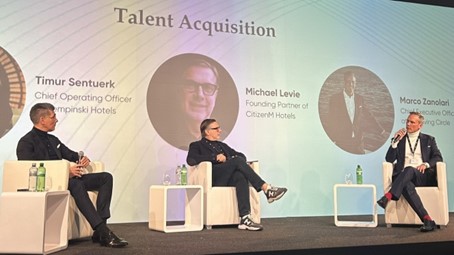
RECRUITMENT - TALENT ACQUISITION: PLACING HUMAN QUALITIES AT THE HEART OF THE CORPORATE CULTURE
In addition to technical skills, the luxury hotel industry is now placing greater emphasis on aligning candidates' personal values with those of the company to ensure lasting success. |
 |
RECRUITMENT - TALENT ACQUISITION: PLACING HUMAN QUALITIES AT THE HEART OF THE CORPORATE CULTURE
In addition to technical skills, the luxury hotel industry is now placing greater emphasis on aligning candidates' personal values with those of the company to ensure lasting success. |
Category: Worldwide - Industry economy
- Careers
- Exclusive experiences
- Trends / Expert's advice - Career - Calendar
Article written by Romane Le Royer on 2024-09-04
 Timur Sentuerk, Michael Levie and Marco Zanolari at the Talent Acquisition Conference at the EHL Young Hospitality Summit 2024
Photo credit © Romane Le Royer
Timur Sentuerk, Director of Operations for the Kempinski Group, owner of 77 hotels worldwide, and Marco Zanolari, Managing Director of the Swiss Living Circle Group, responsible for six hotel and residential properties in Zurich and Ascona, were able to discuss their vision of recruitment, on different and complementary scales.
Know-how and personality
The luxury hotel sector operates in a world of norms, standards and methodical precision, all of which are essential to creating unique experiences for guests. Even if each hotel and each group develops its own specific characteristics, technical training at hotel schools such as EHL has long been considered a prerequisite.
However, ‘personality culture’ is increasingly being considered in recruitment strategies. While technique can be learned, an employee's intrinsic qualities, such as motivation or ingenuity, cannot be imitated or simulated.
At Kempinski, even if a candidate's personality and values can take precedence over skills, certain positions in the company still require a level of professional learning provided by the candidate themselves, independently of that provided later by the group. On the other hand, an employee's success within the Swiss group is built on his or her ability to integrate and take on board the company's culture: ‘For us, it's a question of identifying people who have the right values, who feel they fit into our culture so that they can succeed and feel they have found a home, a workplace where they can be themselves’, Timur Sentuerk told YHS 2024, ‘ Personal values are totally linked to what we stand for. For us, the notions of respect, integrity, commitment to each other, the desire, and willingness to work hard, are all part of what we do. When you're in luxury, you're competing at the highest level, and you need to be personally motivated to succeed.
The size of the Living Circle group allows for a different approach to talent acquisition: any candidate can be a suitable candidate in the right environment. Marco Zanolari and his teams have designed an ‘employee pathway’, from the start of a career to the end, incorporating the intrinsic values and qualities required for each position in the company: interviews are conducted based on a behavioural analysis. Several Living Circle departments meet with a candidate to determine where he or she might best fit in: ‘ For a position of Managing Director, we're looking for someone with clear objectives, prepared to take calculated risks. To support them, we're looking for someone more human, capable of loving and caring for their teams’.
Different methods
A hotel group's vision often influences the way it recruits talent: over and above the candidate's skills and personality, they must be able to find their place in the company, agreeing with its values and its way of operating. There has to be a chemistry between the existing team and the recruit.
Nothing is more important to Marco Zanolari and Living Circle than passion, which is at the heart of the recruitment process. The human resources department and recruiters are not the sole decision-makers when it comes to hiring a candidate: it's a collaborative process, carried out by several people at all levels of a hotel. This method fosters trust between a new employee and the team he or she is joining, as they were involved in the recruitment process: ‘When you start involving several people from the department where the candidate is to work, their support is unrivalled. So failure doesn't exist because it becomes the failure of the person who recruited. It's important to have as many levels as possible involved in the process so that the candidate has unfailing support,’ explains Marco Zanolari.
In a group the size of Kempinski, it is more difficult to involve the entire hierarchical pyramid in recruitment. It's the corporate culture that has to shine through in the way we recruit and identify natural talent. Across the Group's 77 establishments, certain selection rituals and personalities are used: “We select based on who you are, and we want you to integrate very quickly. So we work hard to create a bond with you, to make sure you feel at home and comfortable. Our orientation days include two days where our new employees are immersed in our philosophy, our brand, our history, our motivations, and our objectives,”insists Timur Sentuerk.
An ambivalent relationship between candidate and company
The advent of digital technologies has broken down the barriers between candidates and the companies they apply to. Through their own and hotel group’s networks, they can now find out about the company's values, workplace quality of life, etc.
This less one-sided relationship has changed at every level, for hotel groups and independent hotels alike. For both Marco Zanolari and Timur Sentuerk, the reputation of their hotels, both within and outside their teams, has to match the values promoted by their group.
This need to offer a working environment in line with the brand's philosophy has given rise to a particular focus on the appreciation that employees have of their own work. Kempinski conducts an annual survey of all its employees: “We want to measure what we call 'employee engagement'. Our independent survey partner asks our 24,000 employees 12 key questions such as: Do I have a best friend at work? Do I have the tools and equipment I need to do my job? Am I recognized for my work? Is there someone who cares about me and my development? We want to open up a dialogue and understand our employees to create a meaningful working environment,”explains Timur Sentuerk.
The issue of talent acquisition highlights the importance of cultural compatibility and personal qualities in hotel recruitment. From integration into a corporate culture to a collaborative approach to finding a better match between candidate and team, hotel groups are constantly seeking to evolve to leave more room for the personality of candidates and future employees. Developments in technology have strengthened the dialogue between candidates and companies, making the reputation and commitment of employees more crucial than ever. Let's not forget, over and above technical skills, human qualities remain the key to success in the luxury hotel industry.
|
|




